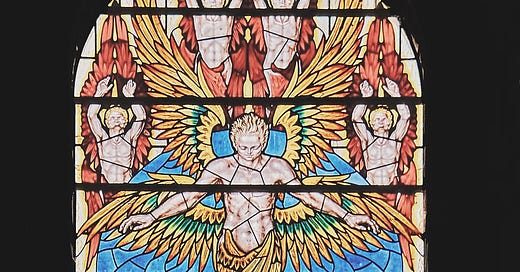Last Sunday, I was part of a well-attended panel discussion about NPR journalist Sarah McCammon’s new book The Exvangelicals, which has become a New York Times bestseller and really helped create space in the national conversation for those of us who have left evangelicalism behind. My friend Emily Autenrieth hosted the discussion at her indie bookstore, A Seat at the Table Books, in Elk Grove, California.
If you’re ever in the Sacramento area, I highly recommend checking the place out. It focuses on books by and about marginalized and underrepresented demographics, has a great cafe and an excellent children’s section (featuring many wonderful books that are banned in Florida schools), and functions as a truly beautiful third space for progressive community in a conservative part of the Golden State where school board meetings are often battles between supporters of inclusion and fascist groups like Moms for Liberty and the Proud Boys.
A significant contingent of attendees at the panel discussion came from a local Methodist church known for its support of LGBTQ individuals. Fully affirming and including LGBTQ individuals in church life, including as ministers and by celebrating same-sex marriages, could until very recently get pastors and parishes in trouble in the United Methodist Church. Only over the last week, at the UMC’s General Conference (a meeting that occurs every four years to set church policy), did the UMC at last remove all language about the “sinfulness” of LGBTQ existence and the impermissibility of full LGBTQ inclusion from the denomination’s official policies.
It has long been the case that many UMC churches in the United States have been relative safe havens for queer individuals, and in recent years, enforcement of the mainline Protestant denomination’s anti-LGBTQ rules has become increasingly spotty and localized. This angered more right-wing, evangelicalish parishes—I always think it’s instructive to recall that both Hillary Clinton and Jeff Sessions are United Methodists.
Those right-wing US parishes, along with conservative African congregations, kept denominational votes from coming out in favor of LGBTQ acceptance until a process was established to allow them to split from the denomination. Over the last few years, thousands of them did so, paving the way for the positive changes in the denomination, although it should be said that the new rules still allow for regionalization, so that UMC churches outside the United States can remain as hostile to gay and trans people as they like.
The pursuit of justice sometimes (often) requires us to be willing to deepen conflicts before moving to make peace. Big tent lovers tend to be peacemakers, thinking it makes them “the bigger person” when all it really does is protect power and the status quo.
That last part is telling, and what was even more telling was observing how many Methodists “grieved” a schism that, to my mind, should have been celebrated, as the anti-queer congregations chose to depart rather than remain in communion with a denomination whose members were mostly in favor queer acceptance. I call this attitude “the romance of the big tent,” and I have never understood it on a visceral level. To me, it has always been clear that some tents are just too big.
Keep reading with a 7-day free trial
Subscribe to The Bugbear Dispatch to keep reading this post and get 7 days of free access to the full post archives.




